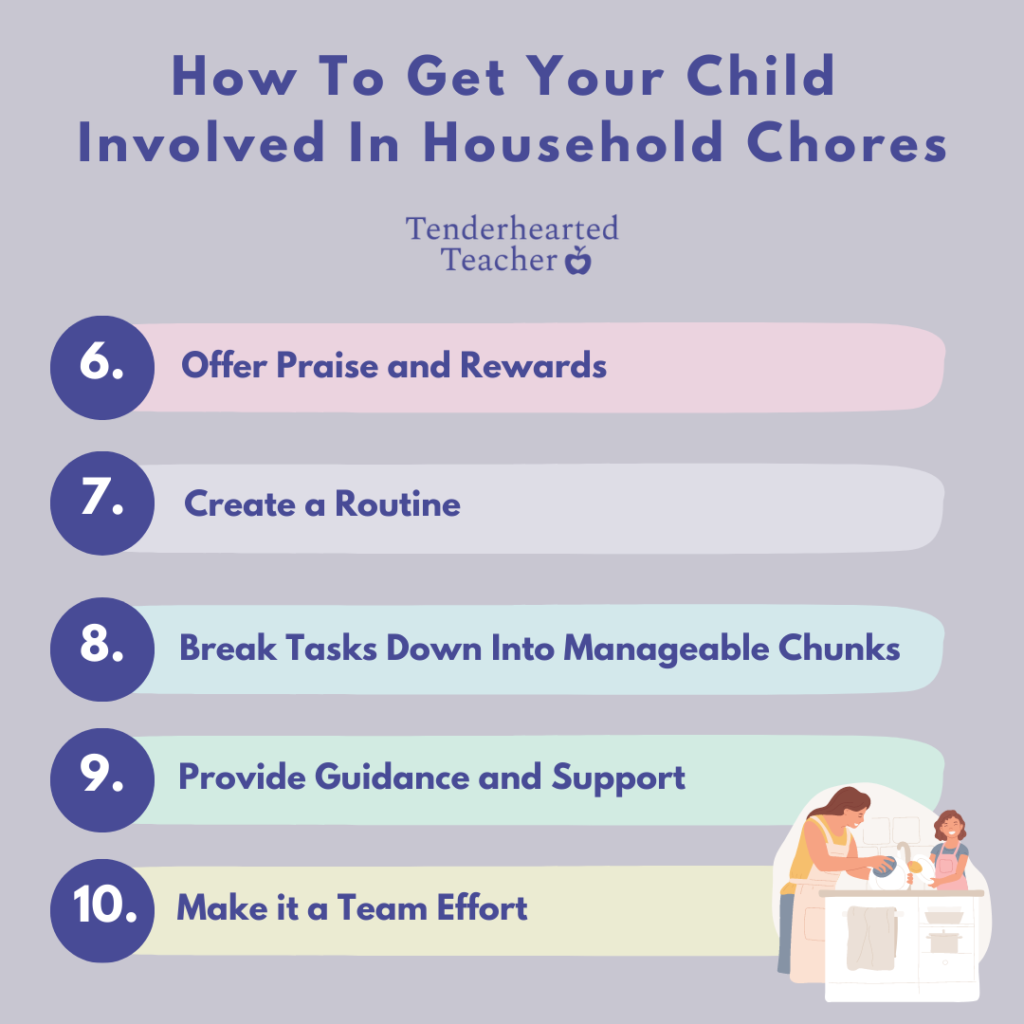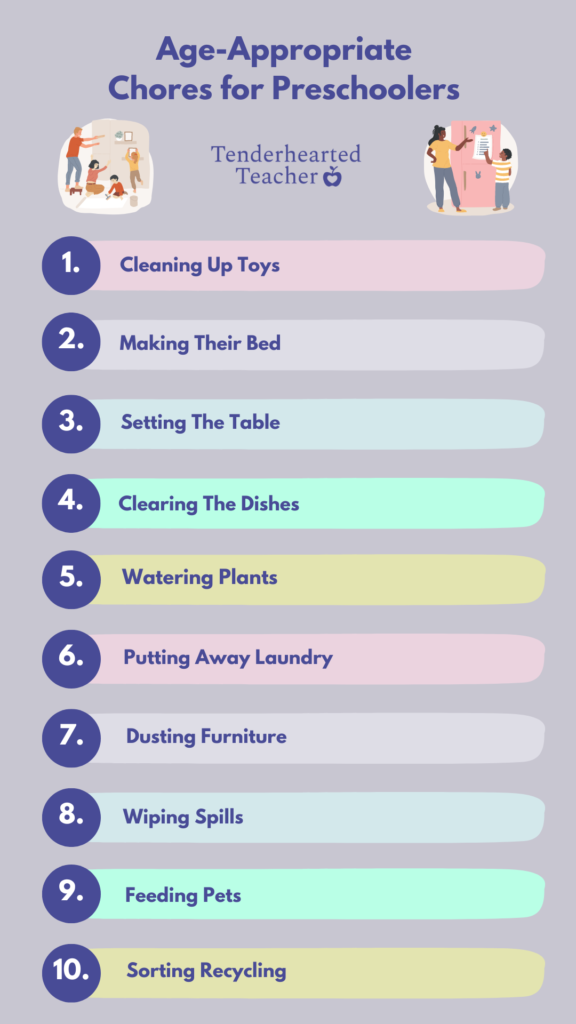
If you’ve been following my blog for awhile now, you already know that the preschool years are a vital stage in every child’s development. That’s because preschoolers are learning so much about the world around them as well as developing fundamental skills that they will carry with them throughout their entire lives. We know that play and hands-on exploration, both indoors and outdoors, are wonderful tools for encouraging important growth and development. But, do you want to know another common household practice that can help set our young children up for success? It’s chores! In this blog post, we will delve into age-appropriate chores for preschoolers, the benefits of chores, and tips for getting your child involved around the house!
What Are the Benefits of Chores for Preschoolers?
There have been several studies over the years to investigate how chores impact a child’s overall development. Much of the research finds that chores teach responsibility, promote independence, and foster a sense of accomplishment—setting the stage for positive lifelong habits.
Additionally, a recent study published by the Australian Occupational Therapy Journal also found “that regular chores were associated with better executive functions—planning, self-regulation, switching between tasks and remembering instructions.” This in turn may help to promote better academic performance and problem-solving skills.
Here are some of the main ways that chores benefit children. They help to:
Develop Life Skills
Preschoolers learn about essential life skills when they engage in chores. For example, they learn how to organize their spaces, take care of their belongings, and even learn about cleanliness.
Promote Responsibility
When preschoolers are given chores it helps them to take ownership of their belongings and personal space and encourages them to be responsible for the things that are important to them.
Build Independence
One of the biggest benefits of chores is how they encourage independence. Young children will learn how to plan, follow multi-step directions, and begin to complete tasks on their own. This, in turn, allows them to build confidence and self-reliance.
Encourage Teamwork and Cooperation
Working together with other family members on household chores teaches children about teamwork and collaboration. It also helps them feel valued for their contributions and efforts.
Cultivate a Strong Work Ethic, Self-Confidence, and Sense of Achievement
When children have the opportunity to witness the positive outcomes of their efforts it helps to build a sense of achievement and a strong work ethic. Additionally, it helps to boost their confidence.
How to Get Your Child Involved in Household Chores


Now we know how chores positively benefit our children. But, the real question remains. How do we get them to do them? Here are 10 simple strategies that can help you encourage your little one to help you with chores at home:
1. Make it fun
Chores don’t have to be, well, a chore! You can use your imagination and creativity to turn chores into a fun game or activity. For example, you can add songs/chants to make it a dance party or you can make it a race to see who can do something the fastest (i.e. who can put all the toys in a basket first.)
2. Set clear expectations
You can’t expect young children to be mind-readers or to know how to do something they’ve never done before. So, it’s imperative that you clearly communicate what you expect them to do. Use simple and age-appropriate language to explain the chore and demonstrate how it’s done before they give it a try.
3. Be a role model
I often talk about how a big part of parenting boils down to modeling the behavior we’d like to see in our children. This relates to housework too. Preschoolers love to be helpers and they want to do the things they see their adults doing… so use that to your advantage! Make sure you model and explain what you’re doing as you go and more than likely you’re little one will offer to help!
4. Assign age-appropriate tasks
This should go without saying, but make sure to assign chores that your child can easily do based on their age and abilities. Preschoolers can handle simple tasks with minimal steps, i.e. picking up toys, making their bed, etc. (Scroll down to the list below for more examples!) So start small and then gradually increase to more advanced chores as your child gets older and more responsible.
5. Use visuals
Visual cues and charts can be helpful for preschoolers to understand what to do as well as keep track of their responsibilities. Download a free copy of my chore chart here!
6. Offer rewards and praise
Positive reinforcement, in the form of praise or rewards, can go a long way with preschoolers. Make sure to acknowledge their efforts and hard work by offering some extra playtime or an activity of their choice once they’ve completed their chores.
7. Create a routine
Children thrive on routines. The more practice your child gets with something the more second-nature it will become. So make sure to establish a consistent schedule or routine for chores, i.e. we make our beds before we eat breakfast.
8. Break tasks down into manageable chunks
Young children can become overwhelmed and/or frustrated with tasks that are too time-consuming or challenging. A quick fix for this is to break chores down into smaller, more manageable parts. For example, instead of asking them to clean the entire room, you can break it down into steps, i.e. first, we’ll put the toys in the basket. Second, we’ll put the books on the shelf, etc. Third, we’ll put the clothes in the hamper.
9. Provide guidance and support
Make sure to have realistic expectations at this age. Their work may not be perfect and that’s okay. Focus more on their effort (meaning the process rather than the product!) Try to be patient and offer guidance if/when necessary. Additionally, it’s important to encourage them to ask for help if they need it.
10. Make it a team effort
Don’t rely on one family member to get everything down on their own. You can assign specific chores to certain family members or you can work together as a team to accomplish tasks together. This teaches children about cooperation and contributes to a sense of pride in their work.
List of Age-Appropriate Chores for Preschoolers
As mentioned above, an important part of getting your child involved in household tasks is making sure to assign ones that are age-appropriate. Here are some examples of household chores that are suitable for preschoolers:
1. Cleaning up toys
One of the simplest tasks for preschoolers is putting their toys away after use. It’s also helpful to organize your play spaces using labels or pictures. This way children understand that each item has its own designated space and it makes for easier clean-up!
2. Making their bed
Encourage your little one to make their bed each morning by straightening up their blankets and arranging pillows and/or stuffed animals.
3. Setting the table
Preschoolers can assist in setting the table with napkins, utensils, and non-breakable cups or plates. You can even take it a step further and have your child help out with food preparation and cooking as well. If you’d like to learn more about that, please read my blog post about cooking with preschoolers here.
4. Clearing dishes
After mealtime, preschoolers can help clear the table by carrying their dishes and flatware to the sink or dishwasher.
5. Watering plants
This is one of my little one’s favorite activities! He loves to get out in the garden with us. Have your child use a small watering can to water indoor or outdoor plants in your garden. Click here for some information about gardening with preschoolers.
6. Putting away laundry
Teach preschoolers to put their dirty clothing in the hamper and to put clean clothes away in their drawers or closets. This activity is great for practicing sorting skills as well, i.e. putting similar items together by color or clothing type.
7. Dusting
Preschoolers can help with dusting surfaces that are within their reach. Provide them with a microfiber cloth or duster and show them how to gently wipe surfaces around your home.
8. Wiping spills
Your child can help clean up minor spills or messes with a paper towel or cloth. You can have your child help wipe down windows or mirrors too.
9. Feeding pets
Family pets bring us all so much joy and have countless benefits for the entire family— one of which is teaching children about responsibility. If you have pets, preschoolers can assist with feeding them. Of course, this should always be done under close supervision and after you talk to them about pet safety.
10. Sorting recycling
Another simple sorting activity can be done using recyclable materials. Have your child organize items by type, i,.e. paper, plastic, and cans, etc. Then show them which bins are designated for each type of material.

Conclusion
Let’s remember that perfection is not the goal when introducing chores at this age! Start small and add more challenging tasks as your child matures and develops more skills. Also, don’t forget to supervise them closely–especially when chores are first introduced, offer guidance/help when needed, and provide positive reinforcement. This will build excitement and encourage them to take on new responsibilities!
Now talk to me! What type of chores do you have your preschooler help with at home? Comment below.
SAVE TO PINTEREST




This is great and I appreciate how you have the two lists with the benefits right at the top. Love it. Thank you for sharing.
I don’t have young kids anymore but I sure wish I had this guide when my son was young. Great tips!
The make it fun part! Yes!
I appreciate the practical tips :). Thank you 🙏